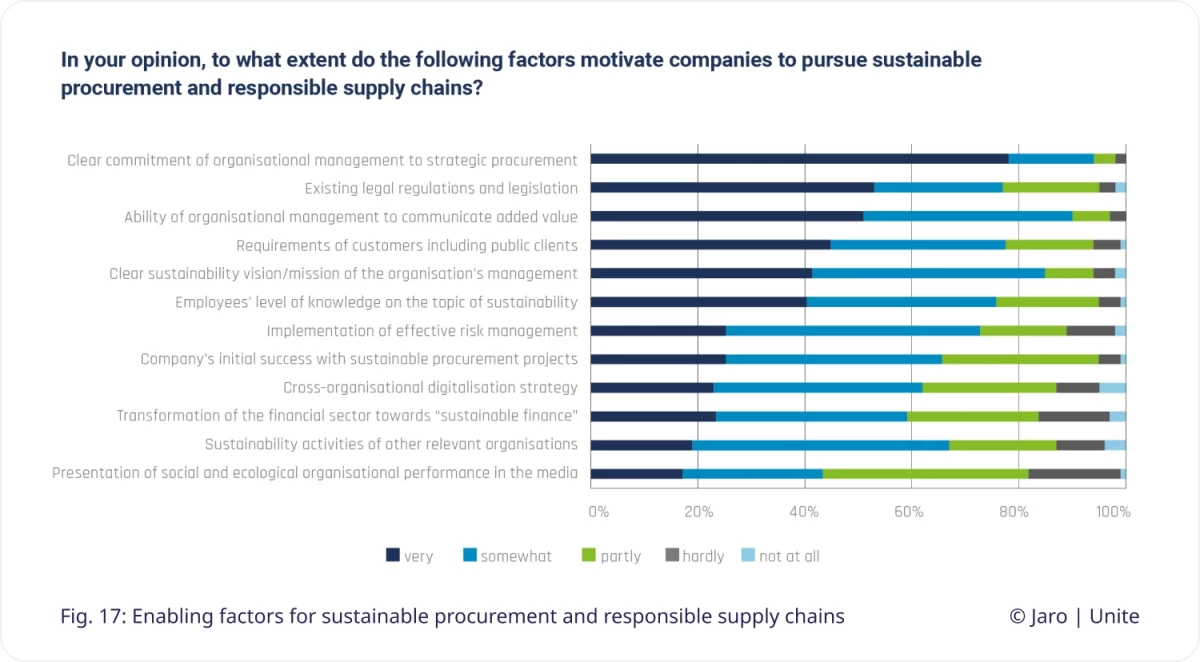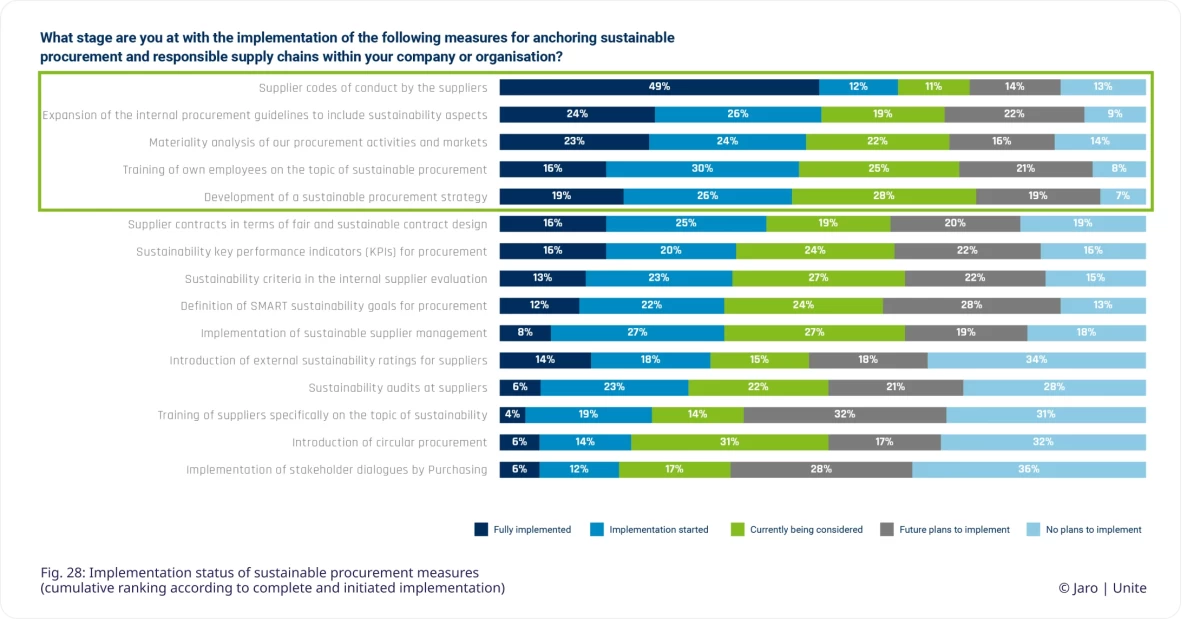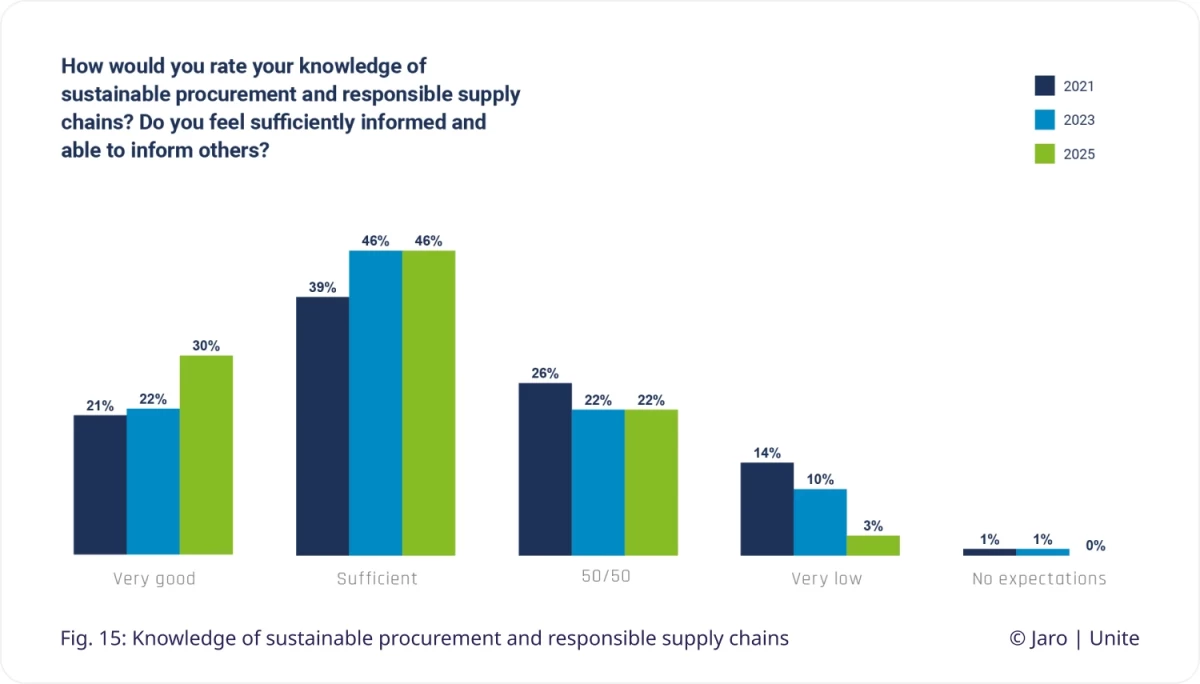The results are in! The JARO Institute for Sustainability and Digitalisation e.V., in partnership with Unite, has published its latest findings from a survey of over 100 procurement professionals and senior leaders from Germany and across Europe.
Sustainable Procurement and Responsible Supply Chains 2025 is the third in a research series (previous surveys were carried out in 2021 and 2023). It’s a deep-dive into the current status of sustainable procurement and responsible supply chains. And it serves as a useful temperature check on the awareness, motivation, evaluation and, above all, practical implementation of sustainability in purchasing.
Here we take a look at some of the findings related to leadership, regulations, price sensitivity, knowledge, and the challenges that remain.
The current climate and regulatory context
Regulatory pressures concerning supply chains and sustainability are mounting, with laws like Germany’s Supply Chain Due Diligence Act (LkSG) and the EU’s Corporate Sustainability Due Diligence Directive (CSDDD). Not only that, but global challenges, such as US tariffs, geopolitical tensions, resource shortages, and economic uncertainty, are impossible to ignore. These regulations are increasingly making sustainability and human rights due diligence in supply chains mandatory, building on the UN Guiding Principles on Business and Human Rights.

Sustainable procurement is not an ideological add-on. It's a strategic instrument for ensuring decent working conditions, protecting natural resources and strengthening fair market mechanisms.
Yvonne Jamal Co-founder and Chairwoman of the Board of Directors at the JARO Institute
Yvonne Jamal, Co-founder and Chairwoman of the Board of Directors at the JARO Institute
While this is undoubtedly agreed upon by many political powers and leading organisations, ongoing political negotiations around EU regulations (like CSDDD and CSRD) are weakening their scope and enforcement, leading to planning uncertainty and delaying corporate investment.
At the same time, the EU is pursuing a broader strategic shift through initiatives like the Clean Industrial Deal (2025), which promotes decarbonisation, digitalisation, low-emission technologies, circular economy, and resilient supply chains. This brings both obligations and opportunities for businesses. That’s why there’s never been a more critical time for decisive and strategic leadership, helping guide organisations through complex and murky waters.
We need to put leadership before laws
One of the biggest takeaways from the research is that while legislation sets the framework for sustainable procurement strategy, leadership is setting the direction. Respondents were asked which factors they thought promoted sustainable procurement and responsible supply chains in businesses and organisations.
In previous surveys “a clear commitment to sustainability” was frequently cited, in 2025, more than three-quarters (78%) saw management commitment as the strongest driver. This far outweighed regulations (53%) or the ability of senior management to communicate its value (51%).
Laws and guidelines are all well and good, but if you want to see effective change, strong leadership is imperative. Specifically, there were two separate factors to consider here: commitment to strategic procurement and a clearly formulated sustainability vision and mission.
That said, just because respondents regarded legal regulations as of lower importance as a direct driver of corporate sustainability activities, this shouldn’t be misconstrued as their irrelevance. Many companies have already implemented existing legal requirements, and they’re now having an impact operationally. That’s likely why the focus has shifted from regulations to internal strategies and structures.
Regulations really work
As mentioned, some newer regulations have been in place for a while, with many organisations well on their way with implementation. The research showed that sustainable procurement is increasingly becoming an integral part of corporate practice. Alongside the strategic debate, regulations are having a real impact on practical sustainability efforts.
No where is this more evident than when it comes to having a supplier code of conduct in place, which 49% of respondents said they already did. This is a big increase from 2023 when just 27% did. And many organisations have expanded their internal procurement guidelines to include sustainability guidance too (24% compared with 17% in 2023).
Another big shift has been the implementation of materiality analyses. These are structured assessments to identify, prioritise, and evaluate the issues that are most significant to a company’s procurement function, its stakeholders, and its long-term business value. The number of organisations using these has almost doubled to 23% of respondents. This cements the fact that, for many organisations, sustainable procurement is no longer theoretical, but is increasingly being embedded operationally as a direct result of regulations.
Tighter budgets are impacting price sensitivity
The concerns those same regulations raised years ago – about whether organisations would have access to a stable supplier base while trying to adhere to new rules – have abated. But this year’s survey did illuminate a negative impact of sustainability measures: there’s been a significant drop in people’s willingness to pay for sustainable products and services, particularly among small and medium-sized companies. There’s an obvious tension here between supply chain due diligence, whereby organisations are able to support sustainable providers, and the pressures of tighter budgets.
At a tough time economically for many industries and individuals, it’s perhaps unsurprising that only 32% of respondents were willing to pay more for products and services from socially and environmentally responsible suppliers. But it is concerning. It’s a significant drop from 45% in 2023. And 30% said they were either “hardly” or “not at all” prepared to pay a premium for more sustainable products or services (versus 21% in 2023).
It shows the importance of a new economic policy narrative that financially secures sustainable business models and frames sustainable products as the preferred choice, rather than the more costly one. This can be achieved by focusing on their lower carbon footprint and higher social value, for example.
Sustainability knowledge is on the rise
In 2023, when asked how they would rate their knowledge of sustainable procurement and responsible supply chains, and whether they felt both sufficiently informed and able to share their knowledge with others, only 22% of respondents said they had very good knowledge in this area. Two years later, 30% of respondents now report they had very good knowledge in the area – a great improvement.
At the same time, the proportion of participants with insufficient knowledge fell significantly (7 percentage points), indicating that, overall, people are more informed and confident in their understanding of sustainabile procurement practices.
This could be in part down to organisatios investing more heavily in skills development. External training is on the up, with 59% of respondents stating this was available (an increase from 32% in 2023) and so are in-house opportunities. This is encouraging as training opportunities are a vital prerequisite for purchasing organisations to develop sustainably and transform their supply chains.
Tuning in to the challenges
For all the positive moving, thanks to strategic leadership, effective implementation of regulations and increased knowledge, procurement departments are still facing a number of unwieldy challenges.
As we already mentioned, they’re navigating considerable cost constraints amid economic uncertainty. There are also resource shortages internally, impacting strategic efforts. Complex regulations require experience and time to interpret and implement – huge change management undertakings for already overworked teams. And that’s all before organisations have engaged their supply chain, integrated their suppliers into their new processes, and brought them along on the journey.
Explore the current state of sustainable procurement

The results show that sustainable procurement is far more than a strategic trend. It reflects a societal shift towards responsibility, resilience and future viability.
Sebastian Wieser Founder and CEO of Unite
Clearly, there’s still lots of work to be done, but this research demonstrates that change is perceptible and significant. With more than two decades of experience in indirect procurement, Unite has closely observed developments in this area and gained valuable insights over many years, adding to the value of this report.
Three big takeaways to keep top of mind are:
Leaders must embed sustainability into procurement strategies – it’s not enough to sit back and hope the legal stuff means it just happens.
Organisations need to invest in training, digital tools, and supplier collaboration. This will help boost existing knowledge and keep your people one step ahead.
Sustainable procurement is shifting from trend to standard. Regulations have done some of the heavy lifting and this strategically essential function is not going anywhere.
Read the study for a detailed analysis
We support sustainable procurement by connecting you to vetted suppliers through our digital marketplace. Our platform includes features to support spend transparency, a diverse and resilient supply chain, and sustainability data integration – all geared to help companies make responsible choices, reduce risks, ensure compliance, and achieve sustainability targets.
Frequently Asked Questions
Sustainable indirect materials procurement focuses on sourcing everyday business goods in a way that reduces environmental impact, supports ethical practices, and ensures cost efficiency. It integrates your ESG criteria into supplier selection, helping you balance operational needs with long-term sustainability goals across your supply chain.
The EU enforces sustainability through regulations such as the Corporate Sustainability Due Diligence Directive (CSDDD), the Corporate Sustainability Reporting Directive (CSRD), and mandatory due diligence rules on supply chains. These frameworks push organisations to measure and disclose environmental, social and governance impacts, making procurement a key lever for compliance and risk management.
We support sustainable procurement by connecting you to vetted suppliers through our digital marketplace. Our platform includes features to support spend transparency, a diverse and resilient supply chain, and sustainability data integration – all geared to help companies make responsible choices, reduce risks, ensure compliance, and achieve sustainability targets.




